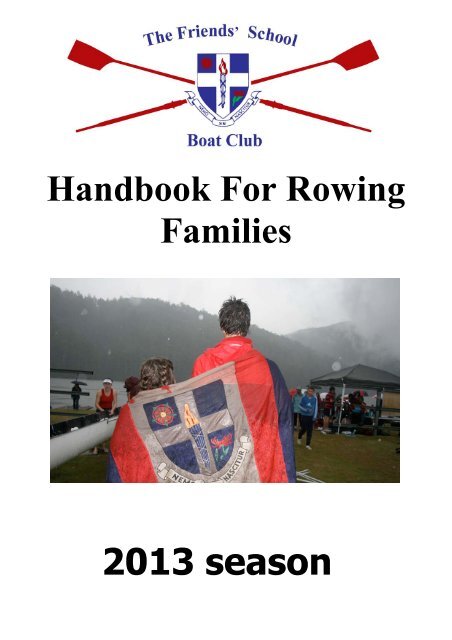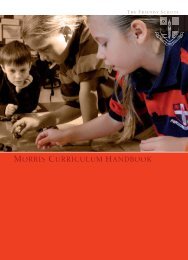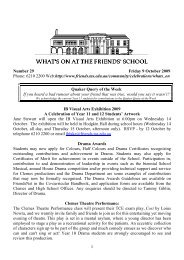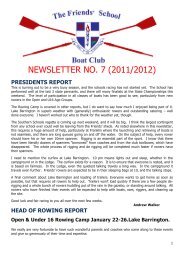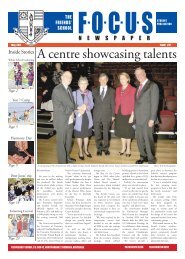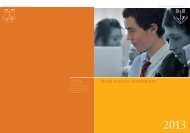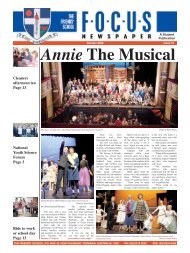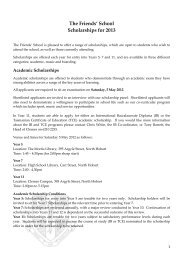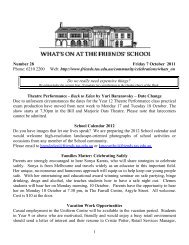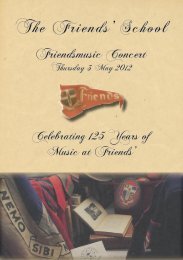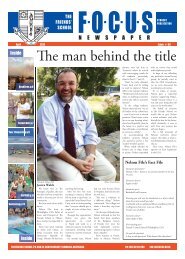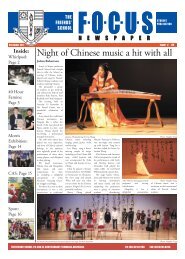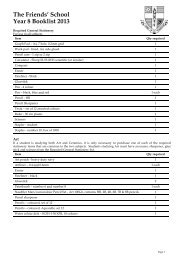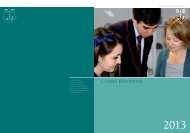Rowing Handbook 2013 - The Friends' School
Rowing Handbook 2013 - The Friends' School
Rowing Handbook 2013 - The Friends' School
Create successful ePaper yourself
Turn your PDF publications into a flip-book with our unique Google optimized e-Paper software.
<strong>Handbook</strong> For <strong>Rowing</strong><br />
Families<br />
INDEX<br />
<strong>2013</strong> season
Table of Contents <br />
Introduction ................................................................................................................ 3 <br />
Season 2012-<strong>2013</strong> ................................................................................................... 3 <br />
Communicating with Parents ........................................................................................ 3 <br />
Newsletters via email ............................................................................................... 3 <br />
Boat Club Web Page ................................................................................................. 3 <br />
Boat Club Contacts ................................................................................................... 4 <br />
What’s On ............................................................................................................... 4 <br />
Tasmanian <strong>Rowing</strong> Website ...................................................................................... 4 <br />
Division of Responsibilities ........................................................................................... 4 <br />
<strong>School</strong> <strong>Rowing</strong> Management Group ........................................................................... 4 <br />
<strong>The</strong> Coaches ............................................................................................................ 5 <br />
Captains of Boats ..................................................................................................... 5 <br />
<strong>The</strong> Family .............................................................................................................. 5 <br />
Parents Support Group ............................................................................................. 5 <br />
Dealing with Parental Concerns .................................................................................... 5 <br />
Tips for Parents ....................................................................................................... 6 <br />
Team Management .................................................................................................. 6 <br />
Fundraising .............................................................................................................. 6 <br />
Australian Sports Foundation .................................................................................... 6 <br />
Maintenance ............................................................................................................ 7 <br />
Car Pooling .............................................................................................................. 7 <br />
Breakfast ................................................................................................................. 7 <br />
Regatta Venues ........................................................................................................... 7 <br />
Franklin ................................................................................................................... 7 <br />
Lake Barrington (LBI) ............................................................................................... 7 <br />
Launceston .............................................................................................................. 8 <br />
Supervision at Regattas ............................................................................................... 8 <br />
Club <strong>Rowing</strong> ............................................................................................................ 8 <br />
Nominated Events on the <strong>Rowing</strong> Calendar ................................................................ 9 <br />
Length of Races ....................................................................................................... 9 <br />
Pathways in <strong>Rowing</strong> ................................................................................................. 9 <br />
Water Safety ........................................................................................................... 9 <br />
Safety Guidelines for Students ................................................................................ 10 <br />
Student <strong>Rowing</strong> Gear ............................................................................................. 10 <br />
Training Kit ............................................................................................................ 10 <br />
Ergometers ............................................................................................................ 10 <br />
Injury Prevention and Health .................................................................................. 11 <br />
Nutrition Strategies for <strong>Rowing</strong> ............................................................................... 11 <br />
Care and Respect of Equipment .............................................................................. 13 <br />
Boat Allocation During Training and Racing .............................................................. 13 <br />
Friends Health & Fitness Passes .............................................................................. 13 <br />
Boat Loading and Unloading ................................................................................... 13 <br />
Pasta Nights .......................................................................................................... 14 <br />
Coaches Appointments ........................................................................................... 14 <br />
Coaches Courses and Accreditation ......................................................................... 14 <br />
TFS-COC-L2-002, v 0.0.1 1
Umpires Accreditation ............................................................................................. 15 <br />
<strong>Rowing</strong> Levies ........................................................................................................ 15 <br />
<strong>The</strong> <strong>Rowing</strong> Sheds – Lallaby Road ........................................................................... 15 <br />
Sculling Skills ......................................................................................................... 16 <br />
Joining <strong>The</strong> Friends’ Boat Club ................................................................................ 16 <br />
Safety and Boating Directions ..................................................................................... 16 <br />
<strong>Rowing</strong> Terms ........................................................................................................... 19 <br />
Identification of Boats ................................................................................................ 21 <br />
<strong>The</strong> Friends’ Boat Club Fleet ....................................................................................... 22 <br />
Record of Friends <strong>Rowing</strong> Award Winners ................................................................... 23 <br />
Friends’ Boat Shed Location ....................................................................................... 27<br />
<strong>Rowing</strong> Tasmania Registration Application Form………………………………………………………. 29<br />
Tasmanian <strong>Rowing</strong> Calendar 2012/<strong>2013</strong> …………………………………………………………………. 30<br />
TFS-COC-L2-002, v 0.0.1 2
Introduction<br />
Season 2012-<strong>2013</strong><br />
Welcome to rowing.<br />
In this booklet we pass on information to help smooth the initiation of rowers and their families into the sport.<br />
<strong>Rowing</strong> is renowned for its enjoyment, fun and camaraderie but it also requires quite a deal of dedication by the athlete<br />
and his/her family.<br />
Rowers are expected to attend all training sessions and be available for all school regattas (referred to later). Unlike<br />
other sports, a single person missing from a rowing training session can mean all crew members miss out on a row.<br />
Once the commitment to row has been made, rowers commit to their coach and their squad and should not absent<br />
themselves from training or regattas without prior notice or explanation.<br />
JUNIOR ROWING: Under 13 – 15<br />
Junior rowing is conducted from mid-October at the conclusion of the SATIS Athletics carnivals and runs through until<br />
the State <strong>School</strong>s <strong>Rowing</strong> Championships.<br />
<strong>The</strong> rowing calendar for the coming season is included at the back of this handbook.<br />
A break from rowing during the summer holidays is usual practice, with the Friends’ Sheds closed for approximately<br />
four weeks during the SATIS <strong>Rowing</strong> Moratorium.<br />
Junior crews row in single sculls, double sculls and quad sculls. Junior crews, for medical, ergonomic and operational<br />
reasons, do not row in sweep oared boats. <strong>The</strong>re are no events for junior crews in sweep boats.<br />
SENIOR ROWING: Under 16 and open<br />
Senior rowing programs may begin some training prior to the completion of the SATIS athletics. All rowing training<br />
however must be secondary to any current Term 3 sports. Friends’ <strong>Rowing</strong> promotes the involvement of athletes in<br />
other sport, particularly athletics for cross training purposes.<br />
A break during the summer holidays is arranged through negotiation with coaches, with an enforced break during the<br />
SATIS moratorium.<br />
Senior rowers experience sweep rowing and continue to develop their sculling skills. <strong>Rowing</strong> conducted in the junior<br />
boat classes expands to include the coxed fours and the fast and exciting eights. Training sessions for Seniors is much<br />
more intensive. Four to five on water sessions together with out of boat training such as running, exercises, ergometer<br />
work, pilates, weights and some other cross training such as mountain runs and bike riding. It seems runs from the<br />
Springs to the Summit of Mt. Wellington has featured on the training programs of our Senior crews in recent years.<br />
Communicating with Parents<br />
Newsletters via email<br />
<strong>The</strong>se will be our chief means of communication and will be sent to rowers and parents via the <strong>School</strong> data base system.<br />
Make sure you read the bulletins and newsletters as they contain information that is important regarding all aspects of<br />
the club’s activities.<br />
Boat Club Web Page<br />
<strong>The</strong> Boat Club web page can be found on the Friends’ home page: www.friends.tas.edu.au (Under the ‘environment’<br />
drop down tab, select ‘Boat Club’)<br />
Recently we have posted copies of the Friends’ <strong>Rowing</strong> Policy documents (dealing with crew selection, boat and<br />
equipment allocation and replacement, Regattas etc) on the website. We recommend that you make yourself familiar<br />
with these documents.<br />
Friends <strong>Rowing</strong> is developing its own Google Website, through which all student members of the rowing community<br />
are able to view and add information, photos, videos etc. <strong>The</strong> site is designed to be developed by the students and<br />
TFS-COC-L2-002, v 0.0.1 3
coaches to share their experiences and assist with disseminating information. In addition, there are links to useful<br />
rowing websites, pages for coaches and other useful information. <strong>The</strong> website is accessed through the student google<br />
account and is overseen by Sam Manson. To access the website, go to:<br />
https://sites.google.com/a/friends.tas.edu.au/friends-rowing/<br />
Boat Club Contacts<br />
Friends’ <strong>Rowing</strong> Boathouse: telephone and facsimile 6228 6975<br />
<strong>The</strong> telephone is available for use by rowers for local calls.<br />
What’s On<br />
Check the What’s On each Friday for rowing dates and announcements of coming events.<br />
http://www.friends.tas.edu.au/whats_on2/whats_on_full<br />
Tasmanian <strong>Rowing</strong> Website<br />
For further information about rowing in Tasmania, check the Tasmanian <strong>Rowing</strong> Council website. This is of particular<br />
interest to those who will be following the Club Pennant Season and Club rowing.<br />
<strong>The</strong>re are draws for these events as well as news of all events (including <strong>School</strong> events) on the Tasmanian rowing<br />
calendar.<br />
www.rowingtas.asn.au/<br />
Division of Responsibilities<br />
<strong>School</strong> <strong>Rowing</strong> Management Group<br />
<strong>The</strong> delivery of the <strong>School</strong> <strong>Rowing</strong> Program is overseen by a team of individuals who collectively have a wealth of<br />
experience in the sport of rowing, as well as in education. <strong>The</strong> structure of the <strong>School</strong> <strong>Rowing</strong> Management Group is<br />
shown below:<br />
Head of Friends’ <strong>Rowing</strong><br />
Greg Hill<br />
President of Friends’ <strong>Rowing</strong><br />
Andrew Walker<br />
Pastoral Care and<br />
Student Issues<br />
<strong>Rowing</strong> Operations<br />
Manager<br />
Fundraising<br />
Committee<br />
Coaching<br />
Co-ordinator<br />
Tony Barrett<br />
Paul Goodluck<br />
David Williams<br />
Sue Stewart<br />
Sam Manson<br />
Deal with issues around<br />
student behaviour and care,<br />
particularly at open level.<br />
Boat shed and equipment<br />
maintenance and use.<br />
Transport. Entries and boat<br />
shed operations.<br />
Represents Parent Support<br />
Group.<br />
Assist co-ordination of<br />
coaching within rowing<br />
program guidelines<br />
Treasurer<br />
Danny McCarthy<br />
Captains of<br />
Boats<br />
To be elected<br />
Administration of all<br />
fundraising and<br />
operating accounts.<br />
Representing student<br />
interests.<br />
TFS-COC-L2-002, v 0.0.1 4
If parents have any questions relating to any of these key areas then they can be directed to the relevant Management Group member:<br />
Head of Friends’ <strong>Rowing</strong> Greg Hill O438 280 530<br />
ghill@friends.tas.edu.au<br />
greghill1945@gmail.com<br />
Coaching Co-ordinator Sam Manson 6210 2200<br />
smanson @friends.tas.edu.au<br />
Pastoral Care<br />
Tony Barrett<br />
Head of Clemes<br />
Paul Goodluck<br />
Head of High <strong>School</strong><br />
6210 2200<br />
tbarrett@friends.tas.edu.au<br />
6210 2200<br />
pgoodluc@friends.tas.edu.au<br />
<strong>Rowing</strong> Operations Manager David Williams Sheds: 6228 6975<br />
Mobile: 0437 005 528<br />
Parent Support Group<br />
Fundraising Committee<br />
david.williams50@bigpond.com<br />
Sue Stewart 0438 357 893<br />
isstewart@netspace.net.au<br />
<strong>The</strong> Coaches<br />
A dedicated panel of volunteer coaches supports the rowing program. Without their assistance, given over long and<br />
irregular hours, we would not have a viable club and we thank them for their committed work.<br />
To help them, please make sure rowers arrive at training on time, properly fed and ready to go.<br />
If unable to make training, it is expected the coach will be notified ASAP by text or phone.<br />
Captains of Boats<br />
<strong>The</strong>se are the student representatives of Friends’ <strong>Rowing</strong>. <strong>The</strong>y are open rowers who are elected by their peers early in<br />
the season. We have a boys and girls representative and depending on the numbers in the Club, vice-captains may also<br />
be appointed.<br />
Boat Captains are required to assist in the organisation of Friends’ <strong>Rowing</strong>. <strong>The</strong>ir duties include attending committee<br />
meetings, assisting the Operations Manager David Williams with boat loading organisation and public speaking<br />
engagements at Friends’ <strong>Rowing</strong> events.<br />
<strong>The</strong> Family<br />
<strong>The</strong>re is an inexplicable addictiveness in playing a supporting role at the club and parents and extended family members<br />
and their areas of expertise are an integral part of activities as diverse as produce stalls, BBQ preparation and speed boat<br />
driving, maintenance, gardening, painting, boat loading and unloading, helping with crews on the launch pontoons etc.<br />
This is well rewarded by friendships within the family of Friends’ rowers and the enjoyment of your child’s<br />
involvement. Check notice boards inside the shed for help needed, make yourself a tea or coffee in our wonderful<br />
facilities upstairs and join in the fun – a presence about the shed is appreciated especially when all crews are on the<br />
water.<br />
Parents Support Group<br />
Our rowing program is maintained and promoted with the assistance of a very active Parents Support Group. <strong>The</strong> Group<br />
assists with conduct of Boat Shed events and fundraising activities, as well as maintenance, transport team management<br />
and regatta support.<br />
<strong>The</strong> Parent Support Group has representation and a clear voice on the Boat Shed Management Group.<br />
Dealing with Parental Concerns<br />
On occasion, issues arise within the Club that may affect the positive experience of membership of Friends’ <strong>Rowing</strong>. At<br />
these times, a protocol is in place that allows for the issues to be dealt with in a structured way.<br />
If a parent or rower has an issue with a coach or a coaching decision, we insist that the first communication of the<br />
problem be with the Head of <strong>Rowing</strong>. Our coaches are precious to us and as they are all volunteers, we aim to give<br />
them all our full support so they can continue to coach effectively.<br />
TFS-COC-L2-002, v 0.0.1 5
For concerns regarding Pastoral Care of Junior rowers, Paul Goodluck can be contacted. For senior rowers, Tony<br />
Barrett can be contacted. On times when it is not appropriate to contact these people, please contact the Head of<br />
<strong>Rowing</strong>. All of these staff members can be contacted through the school switchboard.<br />
After this initial contact, the issue will be followed up and dealt with. Should further action be necessary, the matter will<br />
be passed on to the Deputy Principal who oversees all co-curricular activities.<br />
Tips for Parents<br />
Enjoying the regatta from lake or river edge will be much more comfortable if you bring fold up camping chairs or<br />
something similar. As the weather can be unpredictable, an umbrella would be useful at regattas. When possible the<br />
<strong>School</strong> tent will be erected at the venue to provide both a central collection point, and basic shelter if needed. <strong>The</strong> Boat<br />
Club BBQ is usually available in the tent as well, and available for your use.<br />
Be prepared for extremes of weather. Be prepared for a lot of fun, friendly inter-school rivalry and great action for the<br />
spectator. Binoculars are recommended. You can help your children by being aware that a sensible diet is essential for<br />
the huge energy output needed during a race and have alternative foods from the usual canteen fare. Carbohydrates,<br />
fruit and juices are great, as are avoiding sweets, sticky drinks, heavy pastry and chips at least until after their races.<br />
Team Management<br />
It is important that each of the age groups, both boys and girls, appoint a Team Manager to assist the coach, liaise with<br />
the Boat Shed Committee, the Operations Manager and the Head of <strong>Rowing</strong>.<br />
<strong>The</strong>se tasks includes:<br />
• Assisting with arranging transport where appropriate<br />
• Co-ordinating involvement at pasta nights<br />
• Representing the age group<br />
• Arranging a breakfast roster of parents<br />
Fundraising<br />
This is the cog around which all rowing activity turns. Although supported by the <strong>School</strong>, there is an ongoing need to<br />
raise additional funds and there are numerous ways to do this from the legendary Ausmas Dinner in mid-winter, the<br />
running of stalls, whole regattas, quiz nights etc. Your newsletter will keep you posted.<br />
<strong>The</strong> Fundraising activities of the Boat Club are essential to the current and future rowing programmes conducted from<br />
the shed. We seek your support for all fundraising activities. <strong>The</strong>y are all a lot of fun, creating a good atmosphere within<br />
the club.<br />
Australian Sports Foundation<br />
Friends’ rowing has registered its Boat Purchase and Replacement Policy with the Australian Sports foundation Ltd.<br />
(ASF) to assist donors with our fundraising efforts. <strong>The</strong> Scheme is listed with the Income Tax Assessment Act 1997,<br />
enabling donations of $2.00 or over to the ASF to be tax deductible, an added incentive for making a donation to our<br />
fundraising efforts.<br />
<strong>The</strong> registered Scheme is in the name of <strong>The</strong> Friends’ <strong>School</strong>, directly supports the Friends’ <strong>Rowing</strong> Boat Purchase and<br />
Replacement Policy as administered by the Boat Shed Committee, and the responsible officer for accounting purposes<br />
is Shaun sergeant.<br />
If you would live to avail yourself of this Scheme, and get a tax deduction for your donation, please note that there is a<br />
set procedure to be followed:<br />
• Donors complete an ASF approved donation form<br />
• To be eligible for tax deductibility, all donations are to be made payable to the ASF, not to the friends’ <strong>School</strong><br />
or Friends’ <strong>Rowing</strong><br />
• Cheques and cash donations are banked into the ASF bank account<br />
• Credit card donations can be catered for too<br />
• Signed and completed donation forms are then sent to the ASF by us<br />
• Providing all ASF requirements have been met, the ASF will issue receipts for donations, which will be sent to<br />
us for distribution<br />
• Every two months the funds are deposited by the ASF to the <strong>School</strong>s nominated bank account as an ASF grant<br />
• <strong>The</strong> <strong>School</strong> is asked to acquit ASF grants every six months.<br />
TFS-COC-L2-002, v 0.0.1 6
If you would like further information on the Scheme, or would like to make a donation through the ASF to Friends’<br />
<strong>Rowing</strong>, please contact the Operations Manager, David Williams. We have copies of:<br />
• Approved donor forms<br />
• Promotional material about the Scheme<br />
• Deposit books.<br />
All donations can be processed very quickly, and can also be processed in complete confidence upon request.<br />
<strong>The</strong> Scheme is supported by the Australian Government and the Australian Sports Foundation.<br />
Maintenance<br />
During the Regatta Season, our Operations Manager needs to constantly maintain our fleet and support equipment.<br />
Among our parents there are many trades and talented people who may be able to assist.<br />
If you are able to assist in any way, then you are invited to join our maintenance group. Please advise the Operations<br />
Manager or the Head of <strong>Rowing</strong> of your interest.<br />
Car Pooling<br />
Once squads are established and training times have become more settled, it is often possible to share the burden of<br />
early morning transport between parents. It is a good idea to get to know the other parents in your group to arrange<br />
these time saving, not to mention sleep improving, options.<br />
It is common for parents of a particular squad to get together to provide a support group for the squad and the coach of<br />
the squad.<br />
Breakfast<br />
For those students who are asked to train early in the morning, there are tremendous facilities and services available at<br />
the Boat Club.<br />
Early morning training usually starts at 6.00am. Training usually concludes (recommended) at 7.30am. Students are<br />
then able to shower and breakfast at the Boat Sheds.<br />
Parents will need to organise transport for students to get to school after training.<br />
Regatta Venues<br />
Franklin<br />
<strong>The</strong> rowing course on the Huon River, at Franklin, surrounded by hills and in the middle of the Franklin township,<br />
provides an excellent venue for southern rowing. <strong>The</strong> Tasmanian <strong>Rowing</strong> Council holds two of its Club Pennant<br />
Regattas at the course (usually before Christmas), and the venue is used for the conduct of the Southern <strong>School</strong>s and<br />
Southern Independent <strong>School</strong>s Regattas. While the facilities are obviously not up to the international standard of Lake<br />
Barrington, regattas at Franklin are a very pleasant day out and only half an hour from Hobart.<br />
Lake Barrington (LBI)<br />
Travel to Lake Barrington<br />
Allow approximately three and a half hours drive from Hobart to LBI. Travel to Sheffield either through Railton or<br />
Kimberley, the route is well signposted. When you get to Sheffield, travel straight through the town centre and after<br />
about 1km turn left at the signpost on to the road that takes you through West Kentish and Roland. About 12km beyond<br />
Sheffield a sign indicates a right turn down to the rowing course. <strong>The</strong> road down to LBI is winding, steep and often<br />
slippery, so take care!<br />
Camping at Lake Barrington<br />
An option for regattas at LBI is to camp. Most regattas (other than the SATIS Head of the River) are two day regattas<br />
on Saturday and Sunday. Camping at LBI is permitted on both the Friday and Saturday nights of regattas. Many people<br />
do this and seem to enjoy it! <strong>The</strong>re is a camping site fee of $120.00 for the season, or $20.00 per night per site payable<br />
to <strong>Rowing</strong> Tasmania. A Camping site sticker is issued, and camping is policed.<br />
TFS-COC-L2-002, v 0.0.1 7
Open fires are now prohibited in the camping ground, but open fires are available for cooking in the Barbeque Shelter.<br />
Wood should be used sparingly for cooking. <strong>The</strong> wood supplied is for the use of the general public during the day.<br />
Children must camp with adults and either parents accompany them or prearrange for another parent to act as<br />
supervisor. <strong>The</strong>re is a shower/toilet facility. Water should be used sparingly. It would be appreciated that all campers<br />
collect their own rubbish and dispose of it in the containers supplied. Please note that it is a parents responsibility to<br />
supervise the camping of our athletes.<br />
Saturday Evening Meals<br />
Once again this coming season, evening meals will be on offer at the facilities building on Saturday nights only. <strong>The</strong>se<br />
two course meals are available at all regattas at LBI and are provided by the Tasmanian <strong>Rowing</strong> Council and its<br />
dedicated group of volunteers at a very reasonable price ($10.00 per head).<br />
Launceston<br />
<strong>The</strong> Launceston Course is on the Tamar River, approximately 1200 metres in length, and finishing in front of the Yacht<br />
Club. <strong>The</strong> course is un-buoyed and very much subject to the tide. At low tide, mud flats are exposed and the navigable<br />
water is very narrow.<br />
<strong>The</strong> times for conduct of the regatta are dependant on tides. Usually a morning event on both the Saturday and Sunday.<br />
Friends’ <strong>Rowing</strong> promotes the event for underage crews only. A good chance to have some competition away from<br />
home and close to other facilities such as accommodation and entertainment, and still only two hours away from<br />
Hobart.<br />
In later years the regattas on this course have been well supported by schools from the North and the South.<br />
Supervision at Regattas<br />
<strong>The</strong> supervision of our student rowers at all regattas is a combined and joint responsibility of <strong>School</strong> Staff (appointed or<br />
nominated officers of Friends’ <strong>Rowing</strong>) and parents.<br />
Parents are responsible for:<br />
• <strong>The</strong> transport of students from home to the regatta venue and return (except on such occasions where a bus<br />
may be made available for the transport of rowers)<br />
• <strong>The</strong> provision of accommodation and all meals for the students while attending the regatta<br />
• <strong>The</strong> behaviour and activities of student rowers outside nominated ‘racing hours’ at a regatta<br />
<strong>The</strong> Head of <strong>Rowing</strong> and the <strong>Rowing</strong> Operations Manager (or their duly appointed deputies), on behalf of <strong>The</strong> <strong>School</strong>,<br />
are responsible (with the assistance of coaches and parents), for the supervision of student rowers during ‘racing hours’<br />
at a regatta, or during the unloading or loading of boat trailers.<br />
‘Racing Hours’ means the period commencing daily one hour before the start time of the first race of a regatta program<br />
and concluding half an hour after the last race on a regatta program. During the Racing Hours, student rowers may also<br />
be released to the supervision of parents for such things as arranging accommodation, trips away from the regatta<br />
venue, meals and rest.<br />
If any student rower suffers any injury or becomes ill at any time while attending a regatta (for the period they are<br />
absent from home to attend the regatta), the student rower or their parent or supervising adult are requested to<br />
immediately advise the Head of <strong>Rowing</strong> or the <strong>Rowing</strong> Operations Manager as well as their coach or Team Manager.<br />
Club <strong>Rowing</strong><br />
<strong>The</strong> Friends’ <strong>Rowing</strong> Club is a registered club with <strong>Rowing</strong> Tasmania (RT). Some coaches, predominantly in Open and<br />
Under 16 competition, choose to enter their crews in Club regattas. An application form is available from the<br />
Operations Manager for registration to RT. All rowers who compete at State Pennant Regattas, the Tasmanian <strong>Rowing</strong><br />
Championships and then on to the Australian <strong>Rowing</strong> Championships are required to be registered rowers with <strong>Rowing</strong><br />
Tasmanian, at their own expense.<br />
During club events, students must be under the direct supervision of parents for the duration of the regatta, including<br />
evenings.<br />
TFS-COC-L2-002, v 0.0.1 8
When a student chooses to do both <strong>School</strong> and Club rowing, his/her priority will be to the <strong>School</strong>. In previous years we<br />
have had a good working relationship with a number of clubs who understand this requirement. Early and effective<br />
communication between all parties is the key. This year, Friends’ <strong>Rowing</strong> is pleased to promote all rowers to row Club<br />
events for <strong>The</strong> Friends’ <strong>School</strong>.<br />
If you are interested in Club <strong>Rowing</strong>, please contact the Head of <strong>Rowing</strong> or the Operations Manager who will be able to<br />
refer you to Club contacts.<br />
Nominated Events on the <strong>Rowing</strong> Calendar<br />
<strong>The</strong> rowing calendar of events commences usually in November and then runs through to Easter. Attendance at State<br />
Pennant Regattas conducted by <strong>Rowing</strong> Tasmania is the choice of coaches, crews, squads and individuals<br />
(predominantly rowers in Open squads). <strong>The</strong>se events are not sanctioned events of the <strong>School</strong> rowing program.<br />
It is however the policy of Friends’ <strong>Rowing</strong> that all junior students will compete at the following regattas:<br />
• Southern and Northern Junior Sculling Regattas<br />
• Southern <strong>School</strong>s Regatta (Franklin)<br />
• North West <strong>School</strong>s Regatta (Lake Barrington)<br />
• Launceston Regatta or Launceston Henley Regatta (usually for underage crews) (Tamar River, Launceston) –<br />
one day event only at option of crews/coaches/parents<br />
• Royal Hobart Regatta (usually for Open crews – Hobart)<br />
• State <strong>School</strong> Championships (Lake Barrington)<br />
• SATIS Head of the River (Lake Barrington)<br />
Dates for these regattas are provided in the <strong>Rowing</strong> Calendar following, and we ask that all students and parents mark<br />
their calendars in advance. Regular attendance and competition at regattas has its rewards.<br />
Length of Races<br />
For regattas conducted at the Lake Barrington and Franklin courses:<br />
Open<br />
<strong>The</strong> first division of all races are predominantly over the full 2000m course, with second division held over 1500m.<br />
Under 16<br />
First division races over 1500m, with some second division races over 1000m.<br />
Under 15, Under 14 and Under 13<br />
All races over 1000m (except 500m for U13 single scull at Junior Regattas).<br />
For regattas conducted at other venues (Launceston, Devonport, Royal Hobart), the length of the course varies. <strong>The</strong><br />
Launceston course is usually over 1200m, and Under 13 sculling races will be over 600m.<br />
Pathways in <strong>Rowing</strong><br />
<strong>School</strong> rowing aims to introduce the sport of rowing to our students at a level where they can safely learn skills in a<br />
controlled, educationally sound environment. Many Friends’ students have taken their love of rowing beyond school<br />
involvement, representing clubs in State Pennant Regattas and the Nationals, representing the State at Interstate events<br />
and representing Australia at international events, including the Olympics.<br />
Our program has even drawn the attention of talent scouts from Ivy League Universities in the United States who have<br />
offered rowing scholarships to our athletes.<br />
Water Safety<br />
<strong>Rowing</strong> is an outdoor sport that is subject to variations in the weather. It is also an aquatic activity with a number of<br />
potential hazards. Accordingly, Friends’ rowing is very aware of the need to maintain aquatic safety standards at all<br />
times.<br />
All training done from the Friends’ Boat Sheds must be conducted under supervision. <strong>The</strong> navigation rules imposed by<br />
MAST must be followed, as must the safety rules outlined in this handbook. If training is conducted early in the<br />
morning before sunrise, in the failing light at dusk or in the dark (to be avoided), then navigation lights must be shown<br />
on all rowing boats, and on the accompanying coaches boat.<br />
TFS-COC-L2-002, v 0.0.1 9
Safety Guidelines for Students<br />
Friends’ <strong>Rowing</strong> acknowledges that it has a duty of care for all members of the Club. It is therefore the policy of<br />
Friends’ <strong>Rowing</strong> that:<br />
• All rowers must be able to swim 50 metres in their rowing gear<br />
• Everyone in a motor boat must wear a PFD<br />
• Only licensed drivers are permitted to drive a motor boat<br />
• No students are to drive Club coaches boats<br />
• No rowers are allowed out on the water, however experienced, without on-the-water supervision<br />
• All boats out prior to sunrise or after sunset must have navigation lights.<br />
• A decision on whether to conduct on-water training in times of inclement weather will be made by either the<br />
Head of <strong>Rowing</strong> or the Operations Manager, and their decision made will be respected by all coaches, parents<br />
and rowers.<br />
• <strong>The</strong> use of ergometers or weights in the sheds must be done under supervision<br />
All rowers of Friends’ rowing are required to do a swimming ability test under the supervision of a qualified assessor<br />
prior to taking to the water. Rowers who have done this test will not need to re-do the test. Testing will be conducted at<br />
Friends’ Health & Fitness at a time to be advised.<br />
Student <strong>Rowing</strong> Gear<br />
All rowing gear is now sold through the Friends’ <strong>School</strong> Shop.<br />
Zoot suits $70.00<br />
Long sleeved training tops $45<br />
<strong>Rowing</strong> hats $10<br />
Please note, Under 13 rowers do not wear zoot suits. <strong>The</strong>ir official uniform is the PE striped polo top and navy bike<br />
shorts.<br />
Training Kit<br />
All rowers should bring their complete rowing kit to all rowing training sessions. We are an outdoor sport totally<br />
subject to the weather, and sometimes on-water training is not possible. If rowers have a complete kit with them, other<br />
cross-training opportunities are available to coaches.<br />
<strong>The</strong> rowing kit should contain:<br />
• <strong>Rowing</strong> zootie or shorts and top, and a hat<br />
• Socks to be worn in the boat<br />
• Warm but close fitting training top<br />
• Towel<br />
• Track suit<br />
• Footwear (thongs, scuffs etc.)<br />
• Sand shoes<br />
• Change of clothes<br />
• Water bottle<br />
• Suncreen<br />
Ergometers<br />
<strong>The</strong> Boat Shed ergometers are not to be used by Underage crews unless rowers are under adult/coach supervision.<br />
We have recently upgraded the ergometers, including the installation of ‘sliders’. Sliders are recommended on OH&S<br />
grounds to alleviate muscle strain, particularly back strain. <strong>The</strong> use of ergo’s with sliders means there is a completely<br />
different rowing action on the ergo’s from that experienced in the past, and all athletes will need to be shown the correct<br />
action. <strong>The</strong>y are not toys. Please do not make any adjustments or interfere with their electronics without coaching<br />
supervision.<br />
TFS-COC-L2-002, v 0.0.1 10
Please keep the ergometer area tidy:<br />
• Remove clothing items after use<br />
• Do not move ergometers from the designated area<br />
• Upon completion of your ergometer session, please wipe down the machine (especially the handle and seat)<br />
• Remove all drinking containers after use<br />
• Keep the music down to a level suitable for all other occupants of the building<br />
• Don’t forget to close and lock windows and doors after your session is finished<br />
Injury Prevention and Health<br />
As for all sports, rowing at times has its share of related injuries. If a rower is sick or injured, it is again vital that the<br />
coach is notified as soon as possible. In addition to notification:<br />
• In the case of an injury, an accident report form should be completed and lodged with either the <strong>School</strong> Office,<br />
the Head of Friends’ <strong>Rowing</strong> or the Operations Manager.<br />
• It is good practice to discuss the nature of the injury and the expected duration of it with the coach, who may<br />
be able to offer other training options<br />
Prevention of injuries is the best way of avoiding them, although things like blisters are part of the nature of the sport<br />
(they will pass with time). Good stretching, warming-up and staying warm and practicing good technique will reduce<br />
your likelihood of injury. A set of recommended warming up exercises is available from the Operations Manager on<br />
request.<br />
It is requested that any rower with a pre-existing medical condition inform both the coach and the Head of <strong>Rowing</strong> of<br />
the nature of the condition, the symptoms of deterioration of the condition and also preferred treatment or contact.<br />
<strong>The</strong>re is a section on the rower registration form which covers this.<br />
Nutrition Strategies for <strong>Rowing</strong><br />
Training Nutrition<br />
<strong>Rowing</strong> requires a unique mix of technique, power and endurance. Adolescent rowers have particularly high energy and<br />
carbohydrate requirements to support the physical demands of training and growth.<br />
Carbohydrate<br />
Carbohydrate is the body’s preferred fuel for our muscle and brain. Carbohydrate intake before, during and after<br />
exercise is important to meet the fuel requirements of exercise and ensure the best recovery (see below).<br />
Carbohydrate comes in many forms, but the smart rower will focus on foods containing carbs AND other important<br />
nutrients e.g. wholegrain breads and cereals, fruit, starchy vegetables, pasta, rice, milk, yoghurt, custard.<br />
Protein<br />
Adolescent rower’s require extra protein to assist in the repair and recovery process after exercise and ensure optimal<br />
growth. Aim for about 2 g protein per kg body weight per day (see table below).<br />
Each of the foods provides approximately 10g of protein.<br />
Animal Foods<br />
2 small eggs<br />
30g (1.5 slices) reduced fat cheese<br />
1 cup (250ml) milk<br />
35g lean beef, lamb or pork (cooked weight)<br />
40g chicken (cooked weight)<br />
50g grilled fish/canned tuna or salmon<br />
200g yoghurt<br />
150g Fruche<br />
1 cup custard<br />
Plant Foods<br />
4 slices (120g) bread<br />
3 cups (90g) wholegrain cereal<br />
2 cups (330g) cooked pasta<br />
3 cups (400g) cooked rice<br />
¾ cup (150g) lentils or kidney beans<br />
200g baked beans<br />
120g tofu<br />
60g nuts or seeds<br />
1 cup (250ml) soy milk<br />
100g soy ‘meat’<br />
Eating Before Early Morning Sessions<br />
After an overnight fast (sleeping) liver glycogen (energy) stores are substantially depleted. <strong>The</strong>refore, pre training<br />
carbohydrate intake is important for maintaining blood glucose levels during training sessions. For example, some fruit<br />
and a cereal bar on the way to training along with some water would be a good choice. If tolerating solid food before<br />
training is difficult a liquid meal alternative such as Up & Go, smoothie or even a glass of juice can be useful in<br />
providing essential carbohydrate.<br />
TFS-COC-L2-002, v 0.0.1 11
Making up for the smaller carbohydrate intake before exercise by consuming carbohydrate during the training session<br />
(eg sports drink) is an important strategy. <strong>The</strong> rower should experiment to find a routine that works and is comfortable<br />
for them.<br />
Recovery Nutrition Strategies – the 4 Rs of Recovery<br />
• Refuelling<br />
To optimise the muscle refuelling process, rowers should include carbohydrate in their next meal or snackideally,<br />
within 30 minutes after training or racing.<br />
• Rehydrating<br />
Most rowers finish a training or competition session with some level of fluid deficit. Water or a sports<br />
drink is an important part of recovery.<br />
• Resisting<br />
<strong>The</strong> immune system is suppressed by intensive training. This puts young rowers at risk of succumbing to<br />
an infectious illness during this time. Consuming carbohydrate during and/or within 30 minutes after<br />
training/racing has been shown to reduce the stress on the immune system.<br />
• Repairing and Re-building<br />
Prolonged and high intensity exercise causes a substantial breakdown of muscle protein. Early intake of<br />
foods high in protein can promote muscle rebuilding. Protein consumed within 30 minutes after training<br />
(or in the case of resistance training sessions (weights), immediately before the session), is taken up more<br />
effectively by the muscle into rebuilding processes.<br />
However the protein needs to be consumed with carbohydrate foods to maximise this effect.<br />
Nutritious Carbs + Protein Recovery Snacks/Meals<br />
2 cups breakfast cereal with milk<br />
1 large cereal bars + 200g fruit flavoured yoghurt<br />
1 bread roll with cheese/meat filling + banana<br />
Bowl of fruit salad with 200g fruit yoghurt<br />
2 slices toast or crumpets with peanut butter and 1 cup milk<br />
1 regular milkshake or fruit smoothie.<br />
Hydration Strategies<br />
Drinking regularly during exercise means rowers can prevent the negative effects associated with dehydration and<br />
performance can be improved.<br />
What to Drink?<br />
Research shows that fluid intake is enhanced when beverages are cool, flavoured and contain sodium. This makes sports<br />
drinks an ideal choice during exercise. In addition to replacing fluid and electrolytes lost through sweat, sports drink<br />
also contains carbohydrate which allows re-fuelling to take place during exercise.<br />
Water is still a suitable option during exercise. However water drinkers need to be aware that water does not stimulate<br />
fluid intake to the same extent as sports drinks. Drinking to a plan is therefore crucial when drinking water. Don’t rely<br />
on thirst, because if you are thirsty you are already partly dehydrated.<br />
Competition Nutrition<br />
Rowers should go into each race with fluid and fuel stores topped up, and feeling comfortable after their last meal.<br />
Generally a meal that provides carbohydrate should be consumed 2-3 hours before a race, eg: breakfast cereal, toast,<br />
muffins, sandwiches, yoghurt, fruit. For rowers who struggle to eat before a race, fluids such as Sustagen Sport or<br />
flavoured milk might be better tolerated. Rowers need to organise themselves to have appropriate food and fluids<br />
available at all times at regattas. Don’t rely on the local canteen or kiosk to meet your racing needs. Take along a supply<br />
of your own favourite cereal bars, fluids, fruit –fresh or dried, sandwiches, yoghurt, etc…<br />
Remember your fluid needs. You can be dehydrated from your rowing efforts, and just from sitting in the sun.<br />
Supplements<br />
Many sports bars and supplements are available and marketed in such a way that they lead you to think they are<br />
superior to regular food. Over-consumption of any sports foods can lead to dietary imbalances as well as being an<br />
unnecessary burden on the wallet. Specific sports nutrition advice from a Sports Dietitian will make the rower aware of<br />
the best uses of sports supplements, and can help develop nutrition strategies to meet individual goals.<br />
TFS-COC-L2-002, v 0.0.1 12
Written by Edwina Flakemore, Isabelle Mortl (Grade 10 Rowers), and Maree Taylor, Sports Dietitian in conjunction<br />
with the AIS Sports Nutrition Department, 2010<br />
Care and Respect of Equipment<br />
<strong>The</strong> Friends’ <strong>Rowing</strong> equipment has been gained through great expense and hard work. It is of utmost importance that it<br />
is well looked after so that each item achieves maximum competitive life.<br />
To that end the following suggestions are made:<br />
• Younger age groups should, when necessary, be given assistance when launching and retrieving boats. Boats<br />
are heavy, so please lend a hand to prevent back or other problems. It would be appreciated if parents in<br />
attendance could provide assistance.<br />
• Particular care should be exercised to ensure the fin and rudder are always clear of the launch pontoons<br />
• It is recommended that rowers have 10mm and 11mm open-ended or ring spanners to use for boat<br />
rigging/unrigging<br />
• At regattas, only ever take allocated oars and return to numbered position on the oar rack immediately after<br />
racing so they are ready for the next rower. Make sure any damage to equipment is reported straight away so<br />
that the problem can be noted and dealt with.<br />
• Find out if your help is required at boat loadings and unloading prior to or at regattas. As a general rule, all<br />
rowers are required to be at the sheds at the allocated time for boat loading for a regatta (usually Thursday<br />
afternoon at 4.00pm) and at the sheds for unloading of boats after the regatta.<br />
• Boats must be de-rigged before they are loaded, rigged on arrival at a regatta, de-rigged before transport back<br />
to the sheds. <strong>The</strong> coach will show you what to do first up, and then it is easy.<br />
• When tightening nuts to hold riggers in place, it is important not to do them up excessively tight as this can<br />
damage the boat.<br />
Boat Allocation During Training and Racing<br />
This task is the responsibility of the Operations Manager in consultation with the Head of <strong>Rowing</strong>. Coaches will be<br />
informed of which boats they may use in training and for racing, they are then able to decide which rowers will be given<br />
which boats.<br />
<strong>The</strong>re is no guarantee that a boat used for training will be available for use during racing. <strong>The</strong>re are significant problems<br />
in juggling the use of boats to suit individual crew requirements, taking the regatta program into account. It should be<br />
noted though that rowers win races, not boats. <strong>The</strong> decision as to boat allocation can be difficult, and it is expected that<br />
all rowers, coaches and families will respect the situation. At times during regattas it is impossible to guarantee crews<br />
will get their preference of boat due to time constraints and sharing of equipment. Please respect the considered<br />
decisions that are made on these occasions.<br />
Friends Health & Fitness Passes<br />
Sam Manson will arrange passes for Under 16 and Open Rowers to use the facilities at Friends Health & Fitness.<br />
Please note, this is a privilege, not a right. Use of the facilities is managed by the Centre, and must fit around other<br />
programs they are conducting.<br />
Boat Loading and Unloading<br />
Boat loading is a necessary event prior to a regatta which involves all rowers and as many parents as possible.<br />
In the week prior to a regatta, the Operations Manager spends many hours in preparation. What boats, oars and other<br />
equipment will be needed for a regatta, all of which has to be loaded onto our trailers at the nominated boat loading.<br />
Boat loading is conducted at the Friends’ Boat Sheds at 4.00pm on the Thursday prior to the conduct of a Regatta.<br />
<strong>The</strong>re are many tasks to be fulfilled, and all rowers (apart from the Under 13’s who have not experienced this before)<br />
are well aware that if we all get to work, the task can be done in under one and a half hours. <strong>The</strong> Under 13’s will learn<br />
what needs to be done very quickly.<br />
TFS-COC-L2-002, v 0.0.1 13
<strong>The</strong>re are many tasks, and the process goes like this:<br />
• We have three trailers. <strong>The</strong> ‘large trailer’ carries the eights sections, fours and some doubles, the ‘middle<br />
trailer’ carries fours and double (and on occasions some singles) and of course there is the dedicated ‘singles<br />
trailer’.<br />
• <strong>The</strong> Operations Manager will post a loading diagram showing how the trailers are to be loaded<br />
• ‘Boat Loading Masters’ are appointed to each of the trailers<br />
• <strong>The</strong> Captains of Boats are to supervise the delivery of all equipment to trailers<br />
• No boat is to be carried to a trailer for loading until called for by the Loading Master<br />
• Only specially appointed personnel are to load boats onto the two top levels of the Large Trailer<br />
• All boats to be loaded are to be de-rigged. This is a task for all.<br />
• <strong>The</strong> trays of the trailers should not be loaded with equipment until so directed by the Loading Master.<br />
Essentially this means that the upper levels of the trailers are loaded first so that those loading boats do not<br />
have to clamber over equipment in the trays.<br />
• As a rule of thumb, the riggers for a boat are to travel in the trailer on which the boat is loaded.<br />
• <strong>The</strong> Operations Manager will appoint coaches and some parents to tie down boats<br />
• Because we need to take a lot of oars to a regatta, we have a well-rehearsed method of stowing the oars in a<br />
trailer both to protect them for damage and also to make sure that we have room to get them all on board.<br />
• Ancillary equipment and spare parts are loaded on the towing vehicles.<br />
Boat unloading needs to be conducted after the return of boat trailers from a regatta. As a rule of thumb:<br />
• Boat unloading for a Franklin Regatta occurs one hour after the conduct of the last race, or as otherwise<br />
directed by the Operations Manager<br />
• Boat unloading for a Lake Barrington Regatta occurs four hours after the conduct of the last race, or as<br />
otherwise directed by the Operations Manager<br />
• Boat unloading for a Launceston Regatta occurs two and a half hours after the last race, or as otherwise<br />
directed by the Operations Manager.<br />
Please do not leave a regatta venue without checking with the Operations Manager the time for boat unloading.<br />
All rowers attending a regatta are expected to attend boat unloading. It takes far less time to unload a trailer than it does<br />
to load one. <strong>The</strong> unloading of the trailers can be completed in less than half an hour if the personnel are there.<br />
Pasta Nights<br />
Using a roster system, pasta nights are hosted by all age groups following the conduct of boat loading for regattas<br />
conducted at Lake Barrington.<br />
<strong>The</strong> usual commencement time is 6.00pm, the charge is $5.00 per head and the event concluded well before 7.30pm.<br />
Pasta Nights are a good opportunity for the Head of <strong>Rowing</strong>, <strong>The</strong> Operations Manager and Coaches to disseminate<br />
information. All rowers are asked to attend.<br />
Coaches Appointments<br />
Coaches appointments are made by the Head of <strong>Rowing</strong> and the Director of Coaching.<br />
<strong>The</strong> Club has been most fortunate to receive support from past scholars, parents, friends and senior students in fulfilling<br />
coaching needs.<br />
It is a policy of Friends’ <strong>Rowing</strong> Committee that:<br />
• Only licensed adult drivers can operate <strong>School</strong> coaching boats<br />
• <strong>The</strong>re is to be strict compliance with MAST rules for the operation of coaching boats (PFD’s must be worn at<br />
all times)<br />
• Our coaching staff are to be supported in gaining a Level I Coaching certificate.<br />
Further education for coaches to attain higher level qualifications is also available.<br />
Coaches Courses and Accreditation<br />
Level I and level II Coaches accreditation courses are offered by <strong>Rowing</strong> Tasmania. Friends’ <strong>Rowing</strong> supports the<br />
accreditation of all of its coaches and is committed to subsidising the attendance of any coach, parent or friend of<br />
TFS-COC-L2-002, v 0.0.1 14
Friends’ <strong>Rowing</strong> to these courses. This leads to greater understanding of the sport, parents being able to provide<br />
assistance to coaches and the expansion of our coaching group.<br />
If you are interested in attending a coaching course, please contact the Head of <strong>Rowing</strong> or the Operations Manager.<br />
Umpires Accreditation<br />
In recent years, <strong>School</strong> rowing events have been cancelled due to the lack of umpiring support. This is not the fault of<br />
the registered umpires of <strong>Rowing</strong> Tasmania. <strong>The</strong>y are relatively few in number, are voluntary and fulfil the role most<br />
weekends in all weather from November through to April. We can only but admire their dedication.<br />
Friends’ <strong>Rowing</strong> wishes to take positive steps to support the conduct of <strong>School</strong> events in particular. To this end we<br />
propose, in conjunction with <strong>Rowing</strong> Tasmanian Umpires Panel (BOAT), an accreditation course in umpiring. It is<br />
proposed that there would be an initial seminar held at the sheds, followed by practical experience and assessment at<br />
<strong>Rowing</strong> Tasmanian Pennant Regattas.<br />
Under the RT Rules, umpires can attain an overall accreditation, or be qualified to fulfil specific tasks (Judge at the<br />
Start in aligning crews, Judge at the Finish, Race Umpire, etc.).<br />
We hope that there will be sufficient interest from parents and friends of Friends’ <strong>Rowing</strong> to support this endeavour.<br />
<strong>The</strong> aim is to increase the pool of qualified umpires, particularly in Southern Tasmania, available to conduct events at<br />
Franklin so that we can avoid the cancellation of such events. It is not a proposal to necessarily increase the pool of RT<br />
registered umpires to conduct their Pennant regattas.<br />
If you are interested in supporting this proposal, please advise the Operations Manager.<br />
<strong>Rowing</strong> Levies<br />
<strong>Rowing</strong> is an expensive sport for the school to provide to its students. Boats, oars, fuel for speed boats and travel to<br />
regattas are just some examples of the ongoing expenses incurred by Friends’ <strong>Rowing</strong>.<br />
In addition it should be noted that Friends’ pays all school regatta entrance fees. Entries for club rowing regattas are<br />
charged as an addition to the school accounts at the end of the season.<br />
For this reason, rowing requires a financial contribution from parents in the form of levies.<br />
<strong>The</strong> Friends’ <strong>Rowing</strong> levy is set at $390.00 per rower, with a discount for siblings.<br />
<strong>Rowing</strong> has enjoyed large growth and prosperity in recent years. <strong>The</strong> Friends’ <strong>Rowing</strong> reputation for athletic<br />
achievement and a place for family fun and involvement has drawn a large number of students under its roof. Whilst<br />
this growth is a wonderful reflection on the boat club and rowing as a sport, it also stretches the resources of the club to<br />
its limits.<br />
<strong>The</strong> <strong>Rowing</strong> Sheds – Lallaby Road<br />
Through the great endeavours and hard work of members of Friends’ <strong>Rowing</strong>, and the tremendous support from the<br />
<strong>School</strong>, the sheds have been extensively redeveloped over the past few years. <strong>The</strong>y are sheds to be proud of and they<br />
need to be maintained. <strong>The</strong> Friends’ <strong>Rowing</strong> Committee has developed some guidelines for the use of the shed, and<br />
these will be posted on the noticeboards, but in addition wishes to bring the following matters to your attention:<br />
• <strong>The</strong>re is limited access to the sheds. Only approved personnel will be issued with access codes to the door and<br />
security system<br />
• It is the responsibility of the last person to leave the sheds to ensure that all external doors are closed and<br />
locked (roller doors in particular), lights turned off and the security system is armed<br />
• Access codes are issued to an individual and are for their use only<br />
• No students are permitted in the sheds without appropriate adult supervision<br />
• All equipment removed from the sheds is to be returned before departure<br />
• All equipment at the sheds has its storage location. All equipment is to be returned to its storage location after<br />
use<br />
• Only allocated equipment is to be used by crews<br />
• <strong>The</strong>re is to be no running in the sheds<br />
• <strong>The</strong> change rooms are located on the first floor. <strong>The</strong>y are excellent facilities and are to be maintained in good<br />
condition at all times<br />
• Use of ergometers can only be undertaken under the supervision of coaches.<br />
TFS-COC-L2-002, v 0.0.1 15
Sculling Skills<br />
Friends’ <strong>Rowing</strong> has enjoyed considerable success for many years now and it is quite clear that a major contributor to<br />
the success of the program can be laid at the feet of the late Ray Trousselot. Ray, a teacher at Friends’ of long standing,<br />
played a major role in the operation of the sheds for many years, and introduced a Sculling Skills program to introduce<br />
newcomers to the sport. <strong>The</strong> program has now been conducted every year since the mid 1990’s. <strong>The</strong> program has been<br />
promoted nationally through the Australian National Coaches Conference and has been adopted by many schools across<br />
the Nation.<br />
In memory of Ray, the course is called the Ray Trousselot Sculling Skills Program.<br />
<strong>The</strong> program is usually conducted in the first week of the September/October holiday break.<br />
• <strong>The</strong> use of Open and Under 16 rowers from the prior season as mentors<br />
• <strong>The</strong> involvement of coaches and parents as supervisors<br />
• New rowers (from Year 6 at Morris predominantly, but also new students to Friends’ in all age groups) being<br />
invited to attend<br />
• A progressive training program starting with identification of equipment, the facilities of the sheds, preparation<br />
of sculls to go out onto the water, the carrying of boats, a series of exercises with a rope attached to the rear of<br />
the craft, safety, progress to rowing a scull without a rope and unaided<br />
• A swimming test to ensure all rowers are able to survive in the water in rowing attire.<br />
Joining <strong>The</strong> Friends’ Boat Club<br />
Now that your interest in rowing has been registered with the Head of <strong>Rowing</strong>, it is vital that both students and parents<br />
understand the commitment required for this sport. Please take the time to read through the information contained in<br />
this booklet whether it is your first time learning about the Friends’ Boat Club or if you are an ‘old hand’. If you require<br />
further information or clarification of some of the points covered in this booklet please contact the Head of <strong>Rowing</strong>.<br />
Fill out the registration form and return it to the Head of <strong>Rowing</strong> or any <strong>School</strong> office.<br />
Safety and Boating Directions<br />
<strong>The</strong> safety of all of our rowers, on and off the water, is paramount!<br />
Friends’ <strong>Rowing</strong> looks to achieve a standard of safety protocols to place it at the forefront of rowing programs both<br />
within Tasmania and at a National level. However, the quest for a safe rowing program, both on and off the water, is<br />
something that we all must work together to achieve.<br />
<strong>The</strong> following directions apply to all rowers, all age divisions and to all coaches.<br />
On Arrival<br />
1. Your gear bag and any other clothing should be placed either in the Change Rooms upstairs or at the rear<br />
of the shed on the hooks provided or near to the right of the green door into the Sculling Shed.<br />
2. No clothing or bags should be left at the front of the sheds around the roller doors (trip hazards for those<br />
launching boats).<br />
3. Now is the time to visit the toilet, not as you are about to boat.<br />
4. Important: Remember to complete any warm up exercises as directed by your coach.<br />
5. No running within the boat shed building.<br />
Preparation<br />
Before you go out on the water:<br />
1. All athletes, coaches and coaching boat drivers must make themselves familiar with the accepted method<br />
of managing a swamping. Details are posted on the notice board at the rear of the sheds or refer <strong>Rowing</strong><br />
Tasmania website.<br />
2. All crews are allocated boats for their use. Please do not use any unallocated boats without reference to the<br />
Operations Manager.<br />
3. Place trestles outside the shed in readiness for your return (two trestles for boat and one for oars).<br />
4. Please check your rigging:<br />
• Are foot stretchers in the right position and tightened?<br />
• Are the seat slide fasteners tight?<br />
• Are gates in good working order and all fittings tight?<br />
• Are all rigger bolts in place and tight?<br />
TFS-COC-L2-002, v 0.0.1 16
5. If you are going out before sunrise or after sunset, all boats are to have navigation lights, fitted and<br />
working.<br />
6. Your oars should be placed on the end of the pontoon with the red shovels over the end.<br />
Carrying Boats<br />
1. All sculls are to be carried by two persons.<br />
2. Under 13 and Under 14 crews will require assistance to carry their quad sculls to and from the launching<br />
pontoons – recommend assistance of parents when possible, or at least 8 rowers to carry a quad scull.<br />
3. All rowers should wear some footwear off the water. <strong>The</strong>re could be broken glass, sharp shells<br />
(particularly on the launch pontoons) or needle sharps.<br />
4. <strong>The</strong> carrying of boats should be done in silence so that you can hear any directions.<br />
5. Before any boat is carried to the pontoons, have all of your gear ready, and be ready to row.<br />
6. As you carry boats from the sheds, please watch the riggers to avoid hitting the shed, other boats and other<br />
rowers.<br />
Launch Pontoon Etiquette<br />
1. Proceed with caution onto the pontoons.<br />
2. Have all of your gear there and ready when you arrive (socks, clothing, water bottles, hat, etc.)<br />
3. Maintain silence until your boat has been launched.<br />
4. Feel for the edge of the pontoon with your left foot.<br />
5. Make sure that all the crew is ready to launch the boat together.<br />
6. Make sure the boat is placed in the water without hitting the pontoon to avoid boat damage, particularly<br />
the fin.<br />
7. <strong>The</strong> boat should be held off the pontoon (please do not hold the boat in position with your foot on the<br />
rigger!)<br />
8. Clear the pontoon as quickly as possible to enable other crews to boat.<br />
Water Safety Directions for Rowers<br />
1. Be aware of other boats around you at all times.<br />
2. In coxed boats, the coxswain and the stroke are in charge.<br />
3. In singles and double, please do not forget your course – you have to plan your course in advance, and then<br />
look to see what is in front of you. It is important to establish a lookout protocol to be used by all<br />
crews/scullers. It is the responsibility of the bow rower to ensure that a proper lookout is maintained.<br />
4. No sculler or crew is to depart the launch pontoons unless accompanied by a coaching boat. No exceptions.<br />
5. When travelling North, please stay outside the ‘green pole’ off Woodman Point, regardless of the tide. No<br />
boat should pass between the green pole and the shore – there is a rocky reef.<br />
6. Please do not go close to any shore line – need to avoid rocky outcrops above and below the water line.<br />
7. Keep a weather eye out while you are on the water.<br />
8. If you are going out early before sunrise, then:<br />
• all boats are to have navigation lights fitted.<br />
• All coxswains are to wear luminous vests and armbands.<br />
9. Please remember if for any reason you end up in the water, stay with and hold onto your boat.<br />
Your boat will not sink. It has waterproof compartments to keep it afloat. <strong>The</strong> oars will not sink either. So, hold onto<br />
your boat until assistance arrives.<br />
Water Safety Directions for Coaches<br />
1. Coaches are allocated coaching boats for their use. Please do not use unallocated boats without reference<br />
to the Operations Manager.<br />
2. All drivers of coaching boats are to be licensed.<br />
3. Everyone in a coaching boat is to wear a PFD.<br />
4. “Stormy” PFD’s are for coaches only.<br />
5. <strong>The</strong> driver of a coaching boat is personally responsible for the operation of the craft in accordance with<br />
M.A.S.T. regulations.<br />
6. Coaching boat drivers need to be mindful of speed limits pertaining to boat movements around moored<br />
boats. It is essential also that coaching boats reduce speed as they approach the pontoons. Wash barrelling<br />
into crews/scullers trying to boat or return to the pontoons is dangerous to the athletes and to our<br />
equipment.<br />
7. Please ensure navigation lights are fitted and working before you depart.<br />
8. You should ensure that all safety equipment is on the coaching boat before you depart.<br />
9. <strong>The</strong> driver of a coaching boat has the responsibility of making sure the boat has enough fuel.<br />
10. <strong>The</strong> coaching boat should be launched and ready to depart before crews are boated. Make sure the “bungs”<br />
are in before you launch.<br />
TFS-COC-L2-002, v 0.0.1 17
11. All coaches are requested to carry a mobile phone in case of an emergency. An emergency telephone<br />
number sheet is in the equipment box in each coaching boat.<br />
12. All coaches are to complete the “In/Out Board” entries before they depart. No exceptions.<br />
13. If in doubt as to weather conditions, please err on the side of caution. Check with the weather bureau<br />
before you depart. Contact details provided on “In/Out Boards”.<br />
14. Coaches must be mindful and observant of weather conditions when taking crews afloat. Scullers/crews<br />
must not be allowed to row in conditions or areas of the river where a safe return to the pontoons is in<br />
jeopardy.<br />
Coaches Boat Return to the Sheds<br />
1. All coach boat trolleys are colour coded. Please ensure that coaching boats are placed on the correct<br />
trolleys.<br />
2. <strong>The</strong> entire crew should assist in retrieving boats from the water.<br />
3. Please ensure coaching boats are drained of water, and the “bungs” replaced before you leave the sheds.<br />
4. Please remove all rubbish from the coaching boats after use.<br />
5. All coaching boats are to be returned to the boat bays after training. Forward control boats on eights bay<br />
side and others to centre.<br />
6. Megaphones are to be removed from the coaching boat and placed in the “In/Out Board” cabinet.<br />
7. Please hang up all PFD’s to ensure they are dry and ready for the next coach.<br />
8. Please report any damage to any equipment.<br />
<strong>Rowing</strong> Crew Return to Sheds<br />
1. All boats are to be placed on trestles outside on the tarmac rigging area outside for washing (exception for<br />
eights).<br />
2. All boats are to be rubbed down with sponges and detergent – inside and out. Please pay particular<br />
attention to metal parts.<br />
3. All boats are to be hosed down – inside and out.<br />
4. All oars are to be washed, with particular attention to handles.<br />
5. All boats are to be returned to allocated racking.<br />
6. No sculling boat is to be returned to racking before the riggers have been removed.<br />
7. Please return all equipment to storage after use.<br />
Shed Security<br />
1. A ‘Last Person Out’ Rule applies.<br />
2. Please check that no equipment (buckets, sponges, trestles, coaches boats, tools, rigger gauges etc) are left<br />
outside the sheds.<br />
3. All four roller doors are to be closed and locked.<br />
4. Turn off all lights in Boat Bay.<br />
5. Re-arm the security pad and ensure front access door is properly closed.<br />
TFS-COC-L2-002, v 0.0.1 18
<strong>Rowing</strong> Terms<br />
Back chocks:<br />
Back chocks position:<br />
Blade:<br />
Bow:<br />
Bow ball:<br />
Bow side:<br />
Button:<br />
Canvas:<br />
Catch:<br />
Clearance:<br />
Coxswain:<br />
Crab:<br />
Crew:<br />
Drive:<br />
Feather:<br />
Fin:<br />
Finish:<br />
Front chocks:<br />
Gate:<br />
Gunwale:<br />
Hands away:<br />
Inboard:<br />
Length:<br />
<strong>The</strong> stops preventing the sliding seat from coming off the back end of the slide.<br />
<strong>Rowing</strong> on back chocks means the rower does not use the slide – arms only.<br />
<strong>The</strong> knees of the rower are hard down, and the rower is not moving the seat on the<br />
slide.<br />
Flattened or spoon-shaped end of oar or scull; often used as term for oar.<br />
Two meanings:<br />
• <strong>The</strong> fore-end of the boat<br />
• <strong>The</strong> rower seated at the fore-end of the boat<br />
Safety ball fitted to sharp stem of racing boat.<br />
<strong>The</strong> right hand (starboard) side of the boat, and all rowers whose oars are in the<br />
water on the right side of the boat when viewed from the stern.<br />
Plastic sheath on oar to prevent it slipping through rowlock; adjustable on modern<br />
oars.<br />
<strong>The</strong> decking fore and aft on a racing boat; in race verdicts, the distance between the<br />
bow ball and the bow man’s seat.<br />
<strong>The</strong> part of a stroke when the blade is put in the water.<br />
<strong>The</strong> distance between Stroke’s puddle and Two’s puddle of the previous stroke.<br />
(Cox) Steers the boat from the seat in the stern or a lying position in the bow.<br />
Occurs when the rower fails to get the oar out of the water at the end of the stroke;<br />
can result in the rower being ejected from boat to water.<br />
Rowers who man a boat; American college term for rowing.<br />
<strong>The</strong> part of the stroke between catch and finish.<br />
To turn the blade parallel with the water surface at the start of the recovery to<br />
reduce wind resistance.<br />
Small flat plate perpendicular to the bottom of the boat to aid steering a straight<br />
course.<br />
<strong>The</strong> part of the stroke just before and as the blade comes out of the water.<br />
<strong>The</strong> stops preventing the seat from coming off the aft end of slide as the rower<br />
reaches out to take the catch.<br />
<strong>The</strong> hinged rod which locks the oar onto the swivel mounted on the rigger.<br />
Horizontal plank at the top of the hull running the length of the boat.<br />
<strong>The</strong> act of dropping the oar handle at the finish of the stroke so that the blade leaves<br />
the water and is feathered at the start of the recovery.<br />
<strong>The</strong> distance between the far end of the handle of an oar or scull and the face of the<br />
button. <strong>The</strong> remainder of the oar is called the outboard.<br />
<strong>The</strong> length of a boat (i.e. “<strong>The</strong>y won by a length”); <strong>The</strong> reach of a rower forwards to<br />
take each stroke.<br />
TFS-COC-L2-002, v 0.0.1 19
Oar:<br />
Pitch:<br />
Pontoon:<br />
Puddles:<br />
Rating:<br />
Recovery:<br />
Regatta:<br />
Rigger:<br />
Rowlock:<br />
Rudder:<br />
Run:<br />
Sculling:<br />
Slide:<br />
Standard Rig:<br />
Stern:<br />
Stroke:<br />
Stroke side:<br />
Washing out:<br />
(Sweep oar). A lever approximately 12 feet (360 cm) long by which the rower pulls<br />
against the rowlock to move the boat through the water.<br />
<strong>The</strong> angle at which the oar sits in the gate (<strong>The</strong> angle of the blade from the vertical).<br />
This is adjustable.<br />
(ways) Floating barge used for launching and retrieval of boats<br />
Whirls left in the water caused by the blade as the rower pulls.<br />
<strong>The</strong> rate of stroking, or the number of strokes per minute that a crew is rowing.<br />
<strong>The</strong> part of a stroke cycle between the finish and the catch in which the oar is<br />
feathered and the seat is returned to the aft end of the slide (Front chocks).<br />
A competitive event raced in boats.<br />
<strong>The</strong> metal frame mounted on the side of the boat which supports the swivel and oar,<br />
which is placed approximately 7600 mm from the centre of the boat.<br />
A bracket which swivels on the end of the rigger to support the oar. Also called a<br />
‘gate’.<br />
Steering device attached vertically to the stern or under the hull of a shell.<br />
<strong>The</strong> distance a boat travels in one stroke.<br />
Using two oars or sculls.<br />
<strong>The</strong> rails or tracks upon which the seat travels.<br />
Uniform alternation of riggers (and therefore oars and rowers) in the boat; the rower<br />
in the seat nearest the stern is usually on stroke side.<br />
<strong>The</strong> rear or aftermost part of the boat<br />
Two meanings:<br />
• <strong>The</strong> rower who is seated at the rear of the boat and sets the pace at which<br />
the crew rows<br />
• As described above (one completion of the cycle – catch, drive, finish and<br />
recovery)<br />
<strong>The</strong> left hand (port) side of the boat, and all rowers whose oars are in the water on<br />
the left side of the boat when viewed from the stern.<br />
Occurs when the blade comes out of the water during the pull-through or drive<br />
before the finish.<br />
TFS-COC-L2-002, v 0.0.1 20
Identification of Boats<br />
Single Scull: is the smallest of all<br />
boats used in rowing. It is used by one<br />
athlete, with a pair of sculling blades<br />
(oars) (one in each hand).<br />
Double Scull: two rowers, each using<br />
a pair of sculling blades.<br />
Coxless Pair: rowed by a pair of<br />
rowers each with a single sweep oar.<br />
Coxed Four: four athletes rowing,<br />
each with a single sweep oar. A<br />
coxswain is on board to steer the boat.<br />
Coxed Quad Scull: four athletes on<br />
board, each with a pair of sculling<br />
blades. A coxswain is on board to<br />
steer the boat.<br />
Coxless Four: four athletes on board,<br />
each with a single sweep oar. No<br />
coxswain is on board to steer the boat<br />
- the athlete at the stern of the boat<br />
steers via a cable connecting the<br />
rudder to his foot stretcher.<br />
Coxed Eight: is the largest of all boats used in racing. <strong>The</strong>re are eight rowers on board, each with a single<br />
sweep oar. A coxswain is also on hand to steer.<br />
TFS-COC-L2-002, v 0.0.1 21
<strong>The</strong> Friends’ Boat Club Fleet<br />
Eights<br />
1. Ray Trousselot<br />
2. Christine Howard<br />
3. Wakefield<br />
4. Rose & Waratah<br />
5. New Eight (girls) 2011<br />
Double Sculls<br />
1. Kate Hornsey<br />
2. Kerry Hore<br />
3. Old Scholars<br />
4. Mark Nicholson<br />
5. Wells<br />
6. Chris Potter<br />
Fours and Quads<br />
1. Sam Manson<br />
2. Lyndsay Farrall<br />
3. Stephanie Farrall<br />
4. Clemes<br />
5. Glenn Hay<br />
6. Mr Nic<br />
7. Greg Hill<br />
8. Mark Stott<br />
9. Mark Curtis<br />
10. James Bennett<br />
11. Andrew Gibson<br />
12. David Wells<br />
13. Kirkland<br />
14. Lloyd Mulcahy<br />
15. Oats<br />
16. David Rattray<br />
Single Sculls<br />
1. Sam Beltz<br />
2. John Green<br />
3. Fry<br />
4. Mott<br />
5. Penn<br />
6. Witt<br />
7. Trousselot<br />
8. Given<br />
9. Mr. T<br />
10. Morris<br />
11. Unwin<br />
12. Ransome<br />
13. Mather<br />
14. Hodgkin<br />
15. Constance<br />
16. Walker<br />
17. Backhouse<br />
18. Hunn<br />
19. Flakemore<br />
20.<br />
Double Sculls/Pairs:<br />
1. John & Kim Hepper<br />
2. Caryn Davies<br />
3. Joe Mitchell<br />
4. Friends Centenary<br />
5. Wells<br />
6. Chris Potter<br />
TFS-COC-L2-002, v 0.0.1 22
Record of Friends <strong>Rowing</strong> Award Winners<br />
Underage<br />
Best Clubman<br />
2008 Fergus Reid<br />
2009 Nic Edmondson<br />
2010 Georgia Bentley<br />
Sophie Goodluck<br />
Jess Walch<br />
2011 Jess Walch<br />
Oustanding Performance (Girls)<br />
2008 Hannah Johnstone<br />
2009 Eleni Kalimnios<br />
2010 Eleni Kalimnios<br />
2011 Eleni Kalimnios<br />
Outstanding Performance (Boys)<br />
2008 Callan Smith<br />
2009 Nico Reeve<br />
2010 Nick Hunn<br />
Nico Reev<br />
2011 Dion Li<br />
Encouragement Award (Girls)<br />
2008 Georgia Bentley<br />
2009 Ellie Cash<br />
Lily Kirkland<br />
2010 Tess Nettlefold<br />
Isabelle Mortl<br />
2011 Emma Reeve<br />
Isabella Trousselot<br />
Maddie Bentley<br />
Encouragement Award (Boys)<br />
2008 Joel Solak<br />
Tom Anderson<br />
2009 Oliver Ladlow<br />
2010 Henry Harvey<br />
2011 Matthew Warner<br />
Best Performing Junior Crew Award<br />
2011 Under 15 Girls Quad scull<br />
2012 Under 16 Girls Quad scull<br />
Open<br />
Best Clubman<br />
2008 Richard Ballard<br />
2009 Richard Ballard<br />
2010 Max McQueeney<br />
2011 Nick Hunn<br />
Outstanding Performance (Girls)<br />
2008 Emma-Jayne Warren<br />
2009 Emma-Jayne Warren<br />
2010 Ella-Grace Blackburn<br />
2011 Anna Read<br />
TFS-COC-L2-002, v 0.0.1 23
Outstanding Performance (Boys)<br />
2008 Ed Kay<br />
2009 Lachlan Stewart<br />
2010 Lachlan Stewart<br />
2011 Erik Rowan<br />
Encouragement Award (Girls)<br />
2008 Lauren Anderson<br />
2009 Monica Voute<br />
2010 Katie Garnham<br />
2011 Ashleigh McLarin<br />
Encouragement Award (Boys)<br />
2008 Michael Smith<br />
2009 Woody Stone<br />
2010 Sam Volker<br />
Nic Edmondson<br />
2011 Jacob Cooper<br />
Will Richman<br />
Best Performing Open Crew<br />
2010 Open Boys Quad Scull<br />
2011 Open Girls Quad Scull<br />
All Club Award<br />
Boat Captains<br />
2008 Ed Kay and Amelia Johnstone<br />
2009 Richard Ballard and Lottie Johnstone<br />
2010 Lachlan Stewart<br />
2011 Edwina Flakemore, Nic Edmondson, Callan Smith and Ross Nightingale<br />
2012 Edwina Flakemore and Jacob Cooper<br />
<strong>The</strong> Roger Drummond Regatta Performance Award<br />
2011 Eleni Kalimnios<br />
2012 Emma Reeve<br />
Record of Former Friends’ Rowers in National Teams<br />
1970 David Rattray<br />
1999 Dmitri Colbatch<br />
1999 – 2011 Sam Beltz (Olympian)<br />
1999 – 2011 Caryn Davies (USA) (Olympian)<br />
2000 Robert Oakley<br />
2000 – 2001 Hugh Edwards<br />
2000 Kaspar Hebblewhite<br />
2000 – 2004 Sam Waley<br />
2002 – 2011 Kerry Hore (Olympian)<br />
2003 – 2011 Kate Hornsey (Olympian)<br />
2003 – 2006 Claire Shield<br />
2004 Mollie Hill<br />
2005 – 2006 Anthony Males<br />
2007 – 2010 Nicholas Baker<br />
2009 Ella Flecker<br />
2011 Sam Volker<br />
2012 Elini Kalimnios<br />
Record of Friends’ Head of <strong>The</strong> River Winners<br />
Boys<br />
Four:<br />
1916 Leslie House <strong>School</strong><br />
1928 Clemes College<br />
1931 Clemes College<br />
1932 <strong>The</strong> Friends’ school P. Waters<br />
TFS-COC-L2-002, v 0.0.1 24
1933 <strong>The</strong> Friends’ <strong>School</strong> P. Waters<br />
1939 <strong>The</strong> Friends’ <strong>School</strong> R.L. Marsh<br />
1940 Clemes College<br />
1941 <strong>The</strong> Friends’ <strong>School</strong> Charles Collins<br />
1945 <strong>The</strong> Friends’ <strong>School</strong> Charles Collins<br />
1949 <strong>The</strong> Friends’ <strong>School</strong> Charles Collins<br />
1950 <strong>The</strong> Friends’ <strong>School</strong> Charles Collins<br />
1958 <strong>The</strong> Friends’ <strong>School</strong> John Verney<br />
Eight:<br />
1959 <strong>The</strong> Friends’ <strong>School</strong> John Verney<br />
1960 <strong>The</strong> Friends’ <strong>School</strong> John Verney<br />
1961 <strong>The</strong> Friends’ <strong>School</strong> John Verney<br />
1962 <strong>The</strong> Friends’ <strong>School</strong> John Verney<br />
1968 <strong>The</strong> Friends’ <strong>School</strong> Alan Hay<br />
1975 <strong>The</strong> Friends’ <strong>School</strong> Robert Walker<br />
2001 <strong>The</strong> Friends’ <strong>School</strong> Gavin Wakefield and Jamie Osborne<br />
2002 <strong>The</strong> Friends’ <strong>School</strong> Sam Manson<br />
Boys<br />
Eight:<br />
1994 <strong>The</strong> Friends’ <strong>School</strong> Glenn Hay<br />
1996 <strong>The</strong> Friends’ <strong>School</strong> Glenn Hay<br />
1998 <strong>The</strong> Friends’ <strong>School</strong> Roger Drummond<br />
1999 <strong>The</strong> Friends’ <strong>School</strong> Roger Drummond<br />
2001 <strong>The</strong> Friends’ <strong>School</strong> Roger Drummond<br />
2002 <strong>The</strong> Friends’ <strong>School</strong> Roger Drummond<br />
2003 <strong>The</strong> Friends’ <strong>School</strong> Roger Drummond<br />
2004 <strong>The</strong> Friends’ <strong>School</strong> Roger Drummond<br />
2007 <strong>The</strong> Friends’ <strong>School</strong> Mark Stott<br />
TFS-COC-L2-002, v 0.0.1 25
TFS-COC-L2-002, v 0.0.1 26
TFS-COC-L2-002, v 0.0.1 27
Friends’ Boat Shed Location<br />
Friends’<br />
<strong>Rowing</strong><br />
Bell<br />
Street<br />
Sports<br />
Oval<br />
Friends’ <strong>Rowing</strong><br />
Lallaby Road<br />
Lutana<br />
(off Risdon Road)<br />
Shed Phone/Fax: 6228 6975<br />
Head of <strong>Rowing</strong>: Greg Hill<br />
Mobile:0438 280 530<br />
President: Andrew Walker<br />
Mobile: 0407 870 173<br />
Operations Manager: David Williams<br />
Mobile: 0437 005 528<br />
TFS-COC-L2-002, v 0.0.1 28
TFS-COC-L2-002, v 0.0.1 29
TFS-COC-L2-002, v 0.0.1 30
Document Management<br />
Document Reference TFS-COC-L2-002<br />
Version:<br />
0.0.1 (draft)<br />
Date Effective:<br />
Document Author: <strong>Rowing</strong> Operations Manager<br />
Authorised by: Head of <strong>Rowing</strong><br />
TFS-COC-L2-002, v 0.0.1 31


